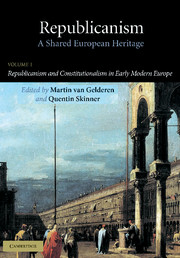Book contents
- Frontmatter
- Contents of Volume I
- Contents of Volume II
- Acknowledgments
- Introduction
- Part I The Rejection of Monarchy
- Part II The Republican Citizen
- 5 Citizenship and Republicanism in Elizabethan England
- 6 Republican Citizenship and Civic Humanism in the Burgundian-Habsburg Netherlands (1477–1566)
- 7 Civic Humanism and Republican Citizenship in Early Modern Germany
- 8 Civic Humanism and Republican Citizenship in the Polish Renaissance
- Part III The Republican Constitution
- Bibliography
- Contributors
- Index of Names of Persons
- Index of Subjects
8 - Civic Humanism and Republican Citizenship in the Polish Renaissance
Published online by Cambridge University Press: 15 December 2009
- Frontmatter
- Contents of Volume I
- Contents of Volume II
- Acknowledgments
- Introduction
- Part I The Rejection of Monarchy
- Part II The Republican Citizen
- 5 Citizenship and Republicanism in Elizabethan England
- 6 Republican Citizenship and Civic Humanism in the Burgundian-Habsburg Netherlands (1477–1566)
- 7 Civic Humanism and Republican Citizenship in Early Modern Germany
- 8 Civic Humanism and Republican Citizenship in the Polish Renaissance
- Part III The Republican Constitution
- Bibliography
- Contributors
- Index of Names of Persons
- Index of Subjects
Summary
Reflections on republican citizenship in the Polish-Lithuanian state should begin with a presentation, if only in the form of an outline, of the foundations of the system prevalent in the Commonwealth of the Two Nations. To comprehend the role played by political theories we must also attend to the struggle waged by the Polish nobility against monarchs and senators for the sake of rights, liberties and the system of the Commonwealth. Frequently, political events preceded theory, which in such cases justified already attained victories; this was the case predominantly up to the mid-sixteenth century. Subsequently, theory often served as an instrument in political combat, and was presented most frequently in the form of ephemeral pamphlets and tracts.
The date which marks the beginning of the modern parliament as an institution in Poland is 1493. At that time a two-chamber general assembly became an established parliamentary form. The upper chamber was made up of members of the king's council, holding the offices of bishops, voivodes and castellans as well as ministers, including the chancellor and deputy chancellors, the grand marshal, the court marshal and the grand treasurer. From that moment they became senators, and the upper chamber was called the Senate. The lower chamber of the general parliament (Seym) was made up of deputies of the nobility selected at so-called land diets (sejmiki). At the same time, provincial parliaments ceased to operate and were transformed into the institution of general land diets.
- Type
- Chapter
- Information
- RepublicanismA Shared European Heritage, pp. 147 - 166Publisher: Cambridge University PressPrint publication year: 2002
- 2
- Cited by



